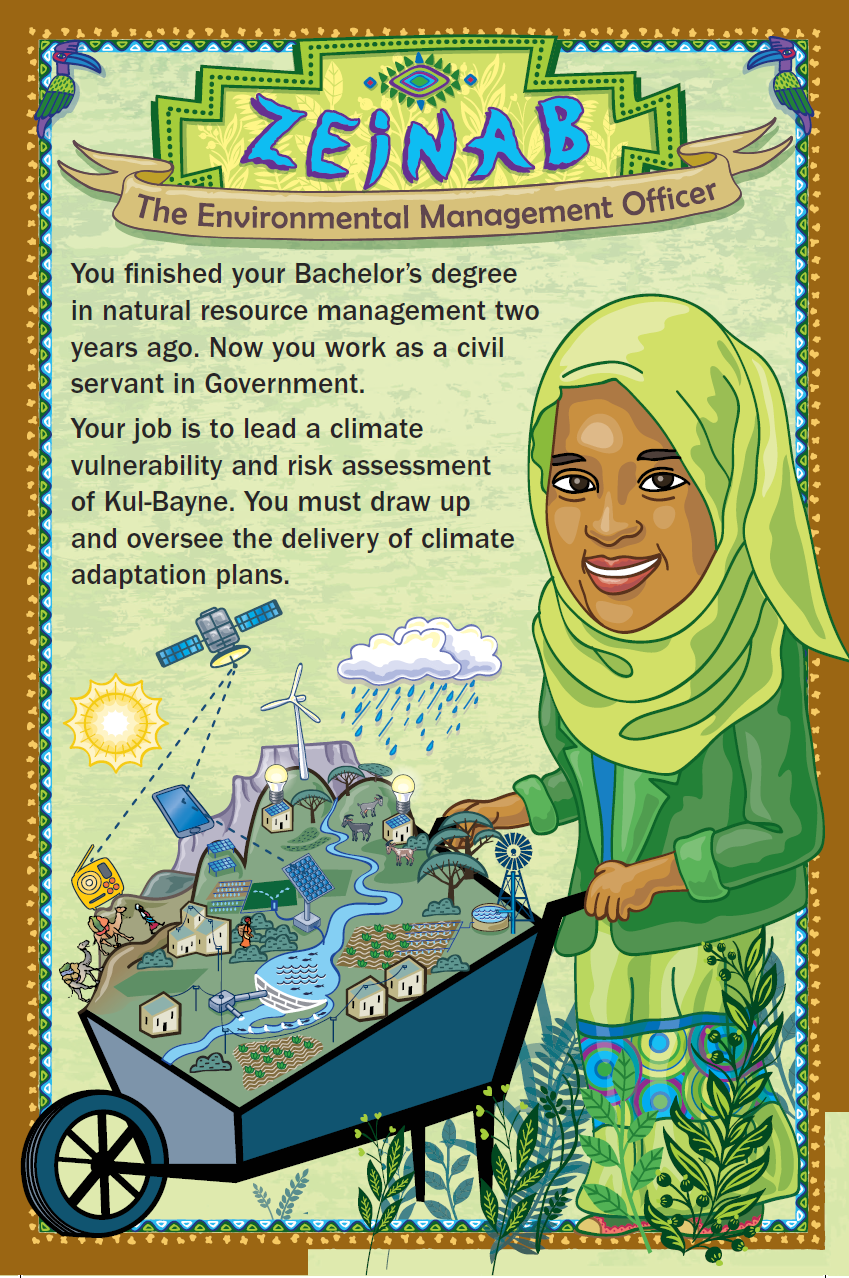This Women's Day, explore CDKN's colourful training materials on gender and social inclusion
This Women's Day, explore CDKN's colourful training materials on gender and social inclusion
How would you feel if you faced climate hazards - in someone else’s shoes? How would your gender, age, your physical and mental abilities, your health, the way other people treat you affect how you could respond? What if different members of the community got together to tackle climate-related problems? How could you make the most of your potential?
CDKN has expanded its interactive role-playing exercises to explore exactly these questions. The new game pack uses a colourful cast of characters set in a fictional, small South Asian town. It complements an interactive role play in 'intersectional' capacity issues set in Ethiopia.
Krishna Nagar - the fictional, low-income neighbourhood in the latest training game - is set in an Indian coastal city. Climate change has brought sea level rise and more frequent high waves, and with it, coastal flooding to the neighbourhood. It has also brought heavier rain, which bursts the banks of the river running through the city and washes dirty water into the streets. Floods have forced people to evacuate several times. Deaths from malaria have increased. Infrastructure and urban services are straining to support people and animals. Something must be done to make the residents’ lives more bearable!
Put yourself in character to have a conversation about what makes you vulnerable to climate and what makes you able to contribute to solutions.
The overarching objectives are to enable workshop or training participants to….
- Understand better how people’s different social, economic, cultural, physical status and attributes, including their gender roles and relations, interact with and contribute to their climate vulnerability and risk by ‘walking in other people’s shoes’.
- Understand how these attributes affect different people’s ability to contribute to individual and collective disaster risk reduction, adaptation and climate-resilient development.
- Highlight, through group discussion, some helpful tools and tactics that project managers could use, in their work, to empower diverse people’s participation in local climate adaptation planning and implementation processes. Pinpoint how the design of such climate adaptation programmes and projects can provide equitable benefits, bearing in mind people’s different social, economic, cultural, physical status and gender.
Before you begin: Download the scenario card to immerse yourself in the world of Krishna Nagar, and the flooding that it faces. Read the title card for more information about the authors and organisations behind the work.
How to play the interactive game, round one
Each Participant takes a character card and reflects on the character and their role in the scenario, paying particular attention to the instructions for ‘Round one’ on their card. (10 min) In the first round of the role play: the Facilitator (who holds the 'Disaster Risk Management Officer' card) explains that she is now consulting on how climate hazards are affecting people in the community and asking what is helping or hindering their participation in the planning process.
She asks these questions to each Participant one by one: Why didn’t you come to the neighbourhood meeting …? How has the flooding affected you and what would improve your situation? Ideally there is time for each character to provide an answer (up to 10 min).
How to play the interactive game, round two
In this ‘Round two: adaptation and resilience plans’ , the Facilitator (Disaster Risk Management Officer) is presenting the community’s adaptation and resilience plan – based on the earlier consultation.
In this scenario, each Participant, in character, is responding to the adaptation and resilience proposals, using the prompts provided under 'Round two' on their character card - and also elaborating their own ideas and responding to others (up to 15 min). In this group reflection at the tables, the Facilitator (Disaster Risk Management Officer) invites a discussion.
First, for the Participants: what emotions did they feel? What frustrations, hopes, opportunities – why? Were the barriers to their participation (in the planning and implementation) something that they felt could be adequately addressed in a climate resilient development programme – if so, how? What other actions and changes would be required to enable them to participate and benefit more fully?
Second, for the Facilitator (Disaster Risk Management Officer character), how did the perspectives of the different characters change the Disaster Risk Management Officer's mind? (10 min)
Aanandi, the disaster risk reduction officer: download her card here
Sitara, the transgender woman: download her card here
Seema, the hardworking mother: download her card here
Shanti Devi, the elderly grandmother: download his card here
Sohail, the teenage boy student: download his card here
Jyoti, the teenage girl student: download her card here
Ram Kumar, the public service professional: download his card here
Mohan, the pastoralist: download his card here
Concept by: Patricia Velasco and Camelia Sofeia, FFLA; Mairi Dupar, ODI. This game written by: Mairi Dupar; and Geeta Sandal and Bedoshruti Sadhukhan, ICLEI South Asia. Artwork: Adam Carnegie.
